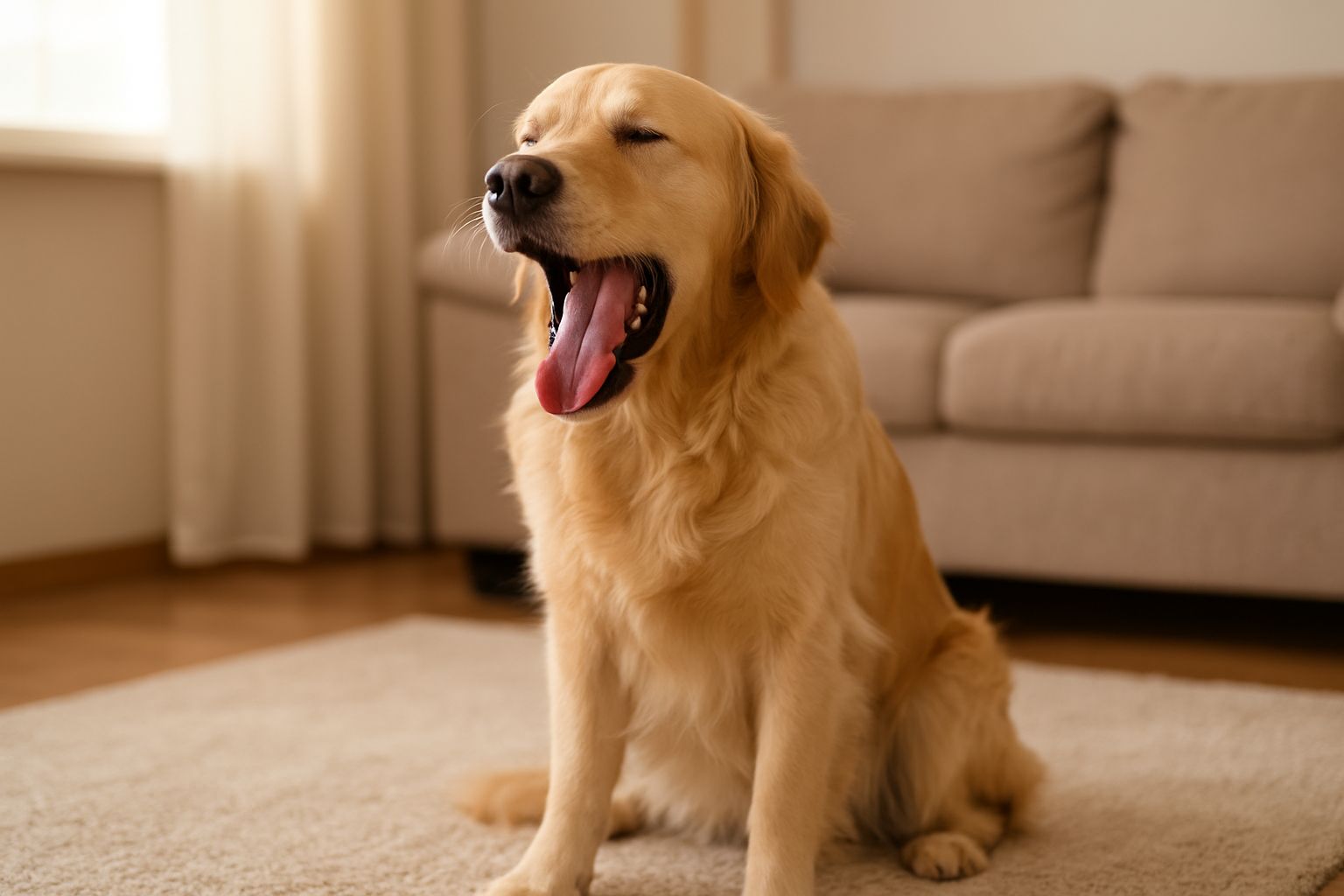- Your Pet's Wellbeing
- Posts
- Why Does My Dog Yawn So Much?
Why Does My Dog Yawn So Much?
When It's Excessive
You’ve probably noticed it. Your dog lets out a big yawn while you’re sitting on the couch, before a walk, or even in the middle of training. While It might seem like they’re just tired, when dogs yawn frequently or at unexpected times, it can mean much more than sleepiness. In fact, unlike humans, there are many reasons why dogs yawn.

The Simple Reason: Your Dog Might Be Tired
Just like us, dogs yawn when they’re sleepy. A long day of play, excitement, or even just lounging around can lead to fatigue. Yawning increases their oxygen intake and helps your dog’s brain stay alert. Therefore, if your pup is stretching and curling up for a nap right after, it’s likely a sign of ordinary tiredness.
However, if your dog yawns frequently when he or she shouldn’t be tired, like during playtime, walks, or social interactions, than it’s time to look into the emotional or behavioral reasons behind it.
Yawning as a Calming Signal
One of the most interesting things about dog behavior is how much they communicate through subtle body language. Yawning is actually one of several calming signals dogs use to reduce tension or express uncertainty. If your dog yawns in the middle of a training session, at the vet’s office, or when you raise your voice, it might be their way of saying, “I’m feeling a little stressed.”
Even further, dogs not only yawn when they are trying to calm themselves down, but also to help you calm down. In a social situation, a dog might even yawn to prevent conflict, especially around other dogs or humans who seem tense. It’s a quiet, peacekeeping gesture that helps everyone feel safer.
Stress and Anxiety: A Common Cause of Excessive Yawning
Excessive yawning in dogs often connects to stress, anxiety, or overstimulation. If your dog is yawning repeatedly and showing other signs like pacing, panting, whining, or avoiding eye contact, stress may be the root cause.
Common stress triggers include:
Loud noises such as thunderstorms or fireworks
Visits to the veterinarian or groomer
Changes in their environment or routine or pushing the clock back!
New people or pets entering the home
In these moments, yawning acts like a built-in coping mechanism. It helps your dog self-soothe and regulate their emotions. If stress yawns happen frequently, look for patterns: what’s happening right before or after the yawning starts?
Identifying the trigger is the first step in helping your dog relax. It’s not that different from when a dog licks his lips frequently.
Yawning From Boredom
Dogs don’t just yawn when they’re tired or anxious, but they also yawn when they’re bored. If your dog is lying around with little stimulation, that slow, drawn-out yawn can signal restlessness or mild frustration. In this case, yawning is a way of saying, “I need something to do.” Offering a quick play session, a chew toy, or a short walk can help relieve that boredom and keep your dog’s mind engaged.
Yawning During Training or Play
It might seem odd, but many dogs yawn right in the middle of an obedience session or game of fetch. This doesn’t necessarily mean they’re bored. Instead, it can signal mental fatigue or confusion. If your dog is struggling to understand a new command or feels pressure to perform, they may yawn as a release.
The same goes for playtime as dogs will sometimes yawn when they’re excited but trying to stay calm. Think of it as emotional balance. If your dog yawns before zooming around the yard or while waiting for you to throw a ball, that’s likely what’s happening.
Yawning and Empathy
Studies suggest dogs may yawn in response to their humans yawning, a phenomenon known as contagious yawning (which can happen with humas too). This kind of yawning points to empathy and an emotional connection. If your dog yawns after you do, it’s not just imitation, it’s a sign they’re attuned your feelings. It’s one of the many ways dogs show their deep emotional intelligence and attachment to their favorite people.
Do Dogs Yawn When They’re Happy?
Yes, dogs can yawn when they’re happy or relaxed, too. You might notice a soft, contented yawn when your dog’s curled up next to you or stretching after a belly rub. In these moments, yawning signals comfort and emotional ease rather than tension. A happy yawn is usually accompanied by loose body language, a wagging tail, and soft eyes and it’s your dog’s way of saying they’re comfortable and content.
When to Worry About Frequent Yawning
Most of the time, yawning is harmless. But if your dog’s yawning becomes excessive or paired with other symptoms, it’s worth checking with your vet. Persistent yawning might sometimes indicate discomfort or even a medical issue, such as nausea, dental pain, or respiratory problems.
If your dog’s yawning is accompanied by drooling, lethargy, or appetite changes, make sure to schedule a vet appointment. Once your vet confirms your dog is physically fine, you can focus on the emotional and behavioral factors instead.
Helping Your Dog Feel at Ease
If you suspect anxiety is causing your dog’s frequent yawning, try creating a calmer environment. Keep a predictable routine, use positive reinforcement during training, and give your dog plenty of exercise and mental stimulation. Some dogs also benefit from calming aids or pheromone diffusers.
The goal isn’t to stop your dog from yawning, but to help your pup feel comfortable enough that they don’t need to use it as a stress signal so often.